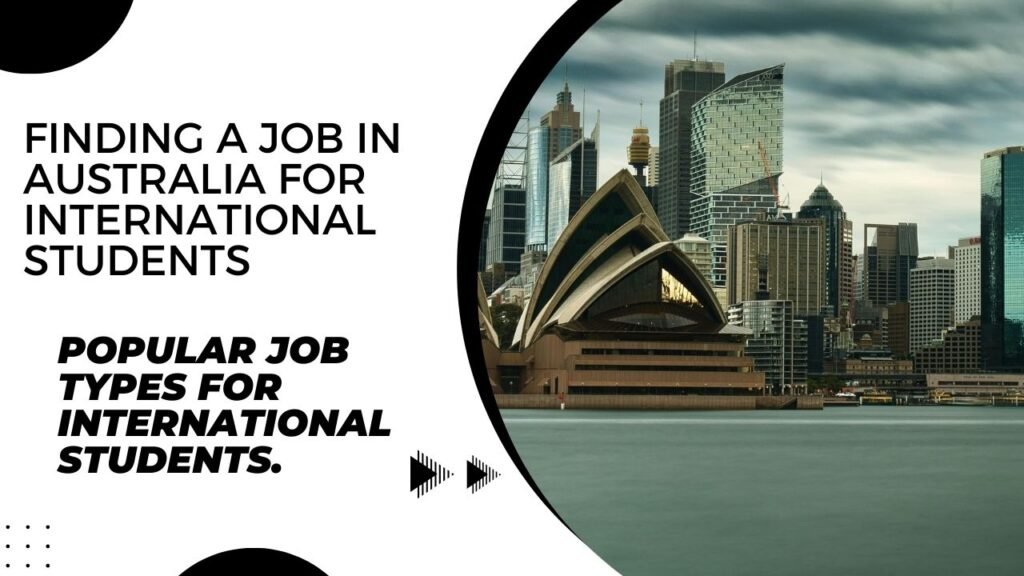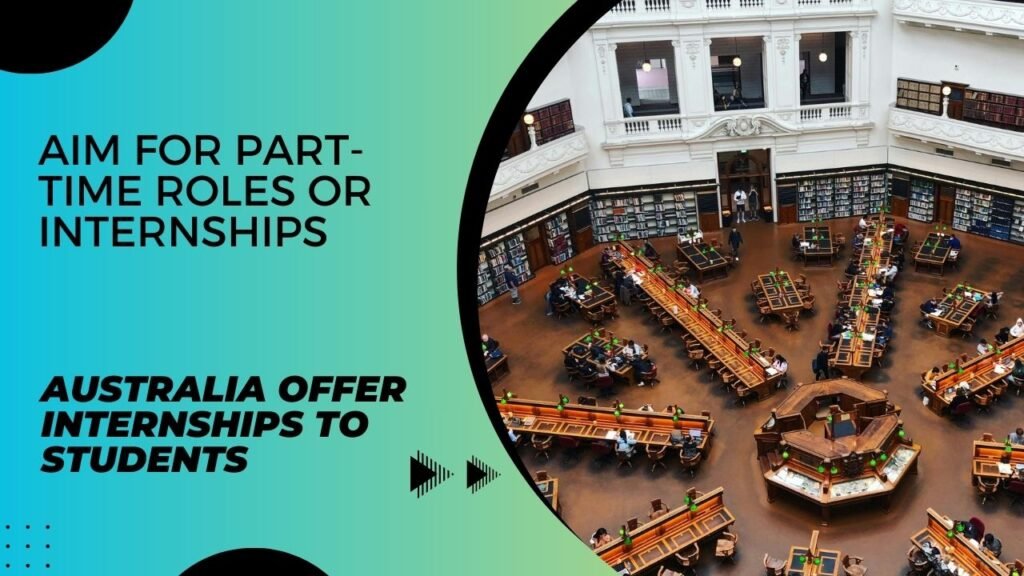Finding jobs in Australia as an international student can be challenging yet rewarding. Many students seek work to support their studies and gain experience.
Australia offers various job opportunities that cater to students from different backgrounds. The country values diversity and encourages international students to join the workforce. Working while studying can help you manage living costs and develop essential skills. Whether you aim for part-time roles or internships, the right job can enhance your experience.
You May Also Like:

Table of Contents
Types of Jobs Available
Finding a job in Australia can be a rewarding experience for international students. The job market is diverse, offering many options to earn money while studying. Students can choose from various types of work that suit their schedules and skills. Knowing the types of jobs available can help students make informed choices. Here are some popular job types for international students.
Part-time Roles
Part-time roles are popular among international students. These jobs allow students to balance work and study. Many students prefer part-time jobs because they offer flexible hours. Here are some common part-time job options:
- Retail assistant
- Food service staff
- Tutoring
- Receptionist
- Library assistant
Part-time jobs typically require students to work up to 20 hours per week during their studies. This is a good way to gain experience and earn extra money. The pay for part-time jobs usually starts at the minimum wage, which is around AUD 20 per hour. Some students might find roles that pay more, especially in skilled areas.
Internships
Internships are valuable for gaining work experience. Many companies in Australia offer internships to students. These roles may be paid or unpaid, depending on the industry. Internships provide practical skills and help students build connections in their field. Here are some benefits of internships:
- Hands-on experience in a real work environment
- Networking opportunities with professionals
- Improved resume and job prospects
Internships can last from a few weeks to several months. Many universities have partnerships with companies that offer internships. This makes it easier for students to find opportunities. Some popular fields for internships include:
| Field | Common Internship Roles |
|---|---|
| Business | Marketing assistant, data analyst |
| Engineering | Engineering assistant, project intern |
| Information Technology | Software developer intern, IT support |
Casual work
Casual work offers flexibility and variety. Many international students choose casual jobs because they can work as needed. These jobs might not have set hours, allowing students to work around their classes. Common casual roles include:
- Event staff
- Hospitality roles
- Warehouse work
- Delivery driver
Casual work pays hourly, and rates can vary widely. Some casual jobs pay well, especially in busy industries like hospitality. Many students enjoy casual work for the chance to meet new people and learn new skills.
Students should remember to check their visa conditions. Most international students can work part-time during the semester and full-time during breaks. This allows for a balance between work and study.
Work Rights for Students
International students in Australia can work while studying. Understanding work rights is essential. It helps students balance studies and finances. Knowing the rules can lead to better job opportunities.
VISA Regulations
Visa regulations are important for international students. They define what students can and cannot do while in Australia. Most students hold a subclass 500 student visa. This visa allows students to work under specific conditions. Here are the key points about visa regulations:
- Students must be enrolled in a registered course.
- Work must not interfere with study commitments.
- Students are allowed to work part-time during semesters.
- Full-time work is allowed during scheduled breaks.
It’s crucial to check your visa details. Students can find information on the Department of Home Affairs website. Below is a summary of work rights based on visa types:
| Visa Type | Work Rights |
|---|---|
| Subclass 500 | Part-time during terms, full-time during breaks |
| Subclass 485 | Full-time work permitted |
| Subclass 482 | Full-time work in specific jobs |
Understanding these regulations helps students stay compliant. Non-compliance can lead to visa cancellation.
Hours Allowed
International students have specific limits on working hours. These limits ensure that study remains a priority. Typically, students can work:
- Up to 40 hours per fortnight during study sessions.
- No limit on hours during semester breaks.
It’s essential to track working hours. Overworking can lead to issues with the visa. Here’s a breakdown of the hours allowed:
| Period | Allowed Hours |
|---|---|
| During Study | Up to 40 hours per fortnight |
| During Breaks | No limit |
Students should keep pay slips and records. This documentation may be needed for visa checks. Balancing work and study is key. Staying organized is important for success.
Finding Job Opportunities
Finding a job in Australia can be exciting for international students. Many opportunities exist to gain work experience. Jobs not only help pay bills but also offer a chance to meet new people. Understanding where to look for these jobs is important. Students can explore online job portals and attend networking events to improve their chances.
Online Job Portals
Online job portals are great for finding job opportunities in Australia. Many websites focus on jobs suitable for students. These platforms allow users to search for jobs based on their skills and interests. Some of the best online job portals include:
- Seek: One of the largest job search websites in Australia.
- Indeed: Offers a wide range of job listings across various sectors.
- CareerOne: Focuses on jobs tailored for students and graduates.
- Jora: A job search engine that aggregates listings from various sources.
Using these portals is easy. Here are some tips for effective job searching:
- Create a strong resume.
- Use keywords related to your field.
- Set up job alerts for quick updates.
- Apply early to increase your chances.
Consider this table to compare popular job portals:
| Job Portal | Features |
|---|---|
| Seek | Largest database, user-friendly interface. |
| Indeed | Aggregates listings, easy to navigate. |
| CareerOne | Focuses on student jobs, career advice. |
| Jora | Wide range of job sources, free to use. |
Online job portals make job hunting straightforward. They provide a platform for students to find suitable job openings.
Networking Events
Networking events are another effective way to find jobs in Australia. These events help students meet industry professionals and other job seekers. Building connections can lead to job referrals. Many universities host networking events. Local organizations and community groups also organize them.
Here are some ways to make the most of networking events:
- Prepare an elevator pitch about yourself.
- Dress professionally to make a good impression.
- Bring copies of your resume to share.
- Follow up with new contacts after the event.
Types of networking events include:
- Career fairs at universities.
- Workshops and seminars related to your field.
- Meetups organized by industry associations.
- Social events for students and professionals.
Attending networking events builds confidence. It also helps create valuable contacts in your industry. Students should take advantage of every opportunity to network.
Resume and Cover Letter Tips
Finding a job in Australia as an international student can be challenging. A strong resume and cover letter are essential tools. These documents showcase your skills and experiences. They help you stand out to potential employers. Here are some tips to make your resume and cover letter effective.
Formatting Guidelines
Clear formatting helps employers read your resume easily. Follow these guidelines:
- Font choice: Use simple fonts like Arial or Calibri.
- Font size: Keep it between 10-12 points for body text.
- Margins: Use 1-inch margins on all sides.
- Length: Limit your resume to one page, especially if you have less than 5 years of experience.
- Sections: Include sections like Contact Information, Education, Work Experience, Skills, and References.
Here’s a simple table to show a recommended layout:
| Section | Description |
|---|---|
| Contact Information | Your name, phone number, and email address. |
| Education | Your degree, institution, and graduation date. |
| Work Experience | Job title, company name, and dates of employment. |
| Skills | Relevant skills for the job you want. |
| References | List of people who can vouch for your work. |
Keep your layout consistent. Use bullet points for easy reading. Ensure there are no spelling or grammar errors. This shows attention to detail.
Tailoring Applications
Each job is unique. Tailor your resume and cover letter for each application. Here’s how:
- Research the company: Understand their values and goals.
- Use keywords: Match words from the job description in your documents.
- Highlight relevant experience: Focus on experiences that relate to the job.
- Customize your objective: Write a specific goal for each job.
Follow this simple format for your cover letter:
- Introduction: State the job you’re applying for.
- Body: Explain why you are a good fit.
- Conclusion: Express enthusiasm for the role and request an interview.
Take time to personalize your documents. This effort shows employers your genuine interest. A tailored application can make a big difference.
Interview Preparation
Finding a job in Australia as an international student can be exciting and challenging. The interview is a key step in landing that job. Good interview preparation helps you make a great impression. It shows employers your skills and commitment. Knowing what to expect can boost your confidence.
You May Also Like:

Common Questions
During job interviews, certain questions often come up. Preparing for these questions can help you feel ready. Here are some common questions you might face:
- Tell me about yourself.
- Why do you want to work here?
- What are your strengths and weaknesses?
- Describe a challenge you faced and how you handled it.
- Where do you see yourself in five years?
Think about your answers to these questions. Write them down and practice saying them out loud. This will help you sound natural and confident.
Consider using the STAR method for behavioral questions. STAR stands for Situation, Task, Action, and Result. This method helps you structure your answers clearly. Here is an example:
| Component | Description |
|---|---|
| Situation | Describe the context or background. |
| Task | Explain your responsibility. |
| Action | Detail what you did. |
| Result | Share the outcome of your actions. |
Practice these questions with friends or family. Their feedback can help you improve your answers.
Dress Code
Your appearance at an interview matters a lot. Dressing well shows respect for the interviewer and the job. It creates a positive first impression. Here are some tips on what to wear:
- Business Formal: This is the safest choice for most interviews. A suit or blazer with dress pants is a good option.
- Business Casual: This can work for some companies. A nice shirt with slacks or a skirt is appropriate.
- Avoid Casual Wear: Jeans, t-shirts, and sneakers are usually not suitable.
Check the company’s culture before your interview. Some workplaces may have a more relaxed dress code. You can visit their website or social media to get an idea.
Here are some tips for women:
- Wear closed-toe shoes.
- Avoid heavy makeup and jewelry.
- Choose professional hairstyles.
For men, consider these points:
- Wear polished shoes.
- Choose a tie if wearing a suit.
- Keep facial hair well-groomed.
Remember, dressing well can boost your confidence. Make sure you feel comfortable in what you wear. This helps you focus on the interview.
Balancing work and Study
Finding a job while studying in Australia can be challenging. Many international students want to earn extra money and gain experience. Balancing work and study is crucial for success. It helps students manage their time and responsibilities. With proper planning, students can enjoy both work and their education.
Time Management
Effective time management is vital for international students. It allows you to balance work hours and study commitments. Here are some tips to manage your time better:
- Use a calendar to mark important dates.
- Set specific study hours each day.
- Allocate time for work shifts.
- Include breaks to recharge.
Creating a weekly schedule can help you visualize your time. Below is a simple table to show how you can organize your week:
| Day | Study Hours | Work Hours | Free Time |
|---|---|---|---|
| Monday | 4 | 4 | 2 |
| Tuesday | 3 | 5 | 2 |
| Wednesday | 5 | 3 | 2 |
| Thursday | 2 | 6 | 2 |
| Friday | 4 | 4 | 2 |
| Saturday | 0 | 8 | 4 |
| Sunday | 0 | 0 | 8 |
This table shows how to plan your week effectively. Adjust your hours based on class schedules and work commitments. Stick to your plan. It helps reduce stress and keeps you organized.
Setting Priorities
Setting priorities is another important skill. It helps you focus on what matters most. Identify tasks that need immediate attention. Here are some ways to set your priorities:
- List your daily tasks.
- Rank them by importance.
- Focus on high-priority tasks first.
- Review and adjust your list weekly.
Use the Eisenhower Matrix to help prioritize tasks. It divides tasks into four categories:
| Urgent and Important | Important but Not Urgent |
|---|---|
| Study for an exam | Complete a project |
| Urgent but Not Important | Not Urgent and Not Important |
| Attend a meeting | Watch a movie |
Focus on tasks in the “Urgent and Important” category first. This method helps you stay on track. Remember, it’s okay to say no to less important tasks. Keep your goals clear.
Conclusion
Finding jobs in Australia as an international student can be rewarding. Many opportunities exist in various fields. Part-time work helps you gain experience and meet new people. Understanding visa rules is crucial for job hunting. Use online resources and networks to find openings.
Stay open to different roles and industries. Balance work with your studies for the best experience. Your time in Australia can lead to valuable skills and connections. Embrace this chance to grow personally and professionally. The journey is just as important as the destination.
